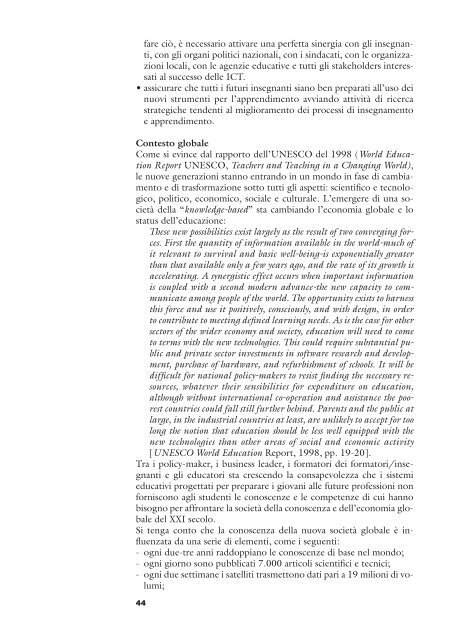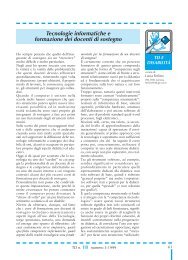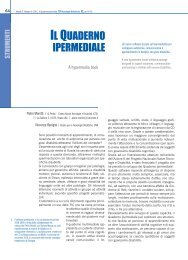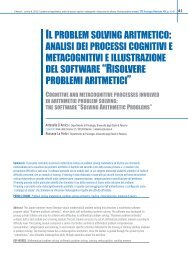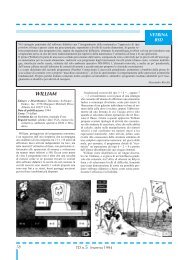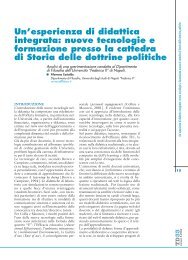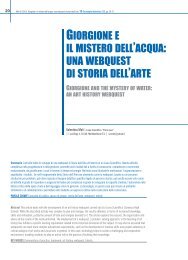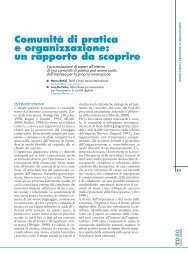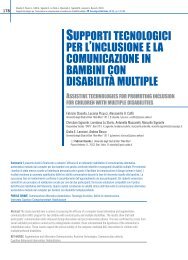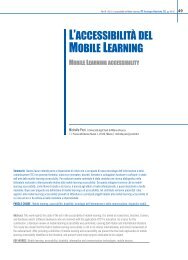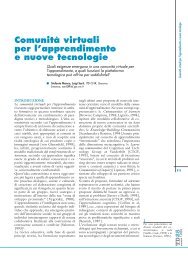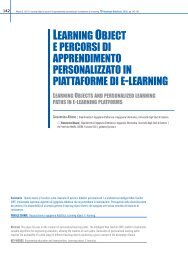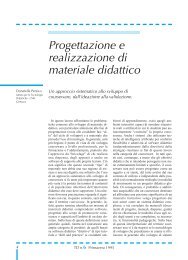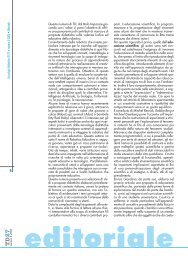Download PDF - Tecnologie Didattiche - Cnr
Download PDF - Tecnologie Didattiche - Cnr
Download PDF - Tecnologie Didattiche - Cnr
Create successful ePaper yourself
Turn your PDF publications into a flip-book with our unique Google optimized e-Paper software.
fare ciò, è necessario attivare una perfetta sinergia con gli insegnanti,<br />
con gli organi politici nazionali, con i sindacati, con le organizzazioni<br />
locali, con le agenzie educative e tutti gli stakeholders interessati<br />
al successo delle ICT.<br />
• assicurare che tutti i futuri insegnanti siano ben preparati all’uso dei<br />
nuovi strumenti per l’apprendimento avviando attività di ricerca<br />
strategiche tendenti al miglioramento dei processi di insegnamento<br />
e apprendimento.<br />
Contesto globale<br />
Come si evince dal rapporto dell’UNESCO del 1998 (World Education<br />
Report UNESCO, Teachers and Teaching in a Changing World),<br />
le nuove generazioni stanno entrando in un mondo in fase di cambiamento<br />
e di trasformazione sotto tutti gli aspetti: scientifico e tecnologico,<br />
politico, economico, sociale e culturale. L’emergere di una società<br />
della “knowledge-based” sta cambiando l’economia globale e lo<br />
status dell’educazione:<br />
These new possibilities exist largely as the result of two converging forces.<br />
First the quantity of information available in the world-much of<br />
it relevant to survival and basic well-being-is exponentially greater<br />
than that available only a few years ago, and the rate of its growth is<br />
accelerating. A synergistic effect occurs when important information<br />
is coupled with a second modern advance-the new capacity to communicate<br />
among people of the world. The opportunity exists to harness<br />
this force and use it positively, consciously, and with design, in order<br />
to contribute to meeting defined learning needs. As is the case for other<br />
sectors of the wider economy and society, education will need to come<br />
to terms with the new technologies. This could require substantial public<br />
and private sector investments in software research and development,<br />
purchase of hardware, and refurbishment of schools. It will be<br />
difficult for national policy-makers to resist finding the necessary resources,<br />
whatever their sensibilities for expenditure on education,<br />
although without international co-operation and assistance the poorest<br />
countries could fall still further behind. Parents and the public at<br />
large, in the industrial countries at least, are unlikely to accept for too<br />
long the notion that education should be less well equipped with the<br />
new technologies than other areas of social and economic activity<br />
[UNESCO World Education Report, 1998, pp. 19-20].<br />
Tra i policy-maker, i business leader, i formatori dei formatori/insegnanti<br />
e gli educatori sta crescendo la consapevolezza che i sistemi<br />
educativi progettati per preparare i giovani alle future professioni non<br />
forniscono agli studenti le conoscenze e le competenze di cui hanno<br />
bisogno per affrontare la società della conoscenza e dell’economia globale<br />
del XXI secolo.<br />
Si tenga conto che la conoscenza della nuova società globale è influenzata<br />
da una serie di elementi, come i seguenti:<br />
- ogni due-tre anni raddoppiano le conoscenze di base nel mondo;<br />
- ogni giorno sono pubblicati 7.000 articoli scientifici e tecnici;<br />
- ogni due settimane i satelliti trasmettono dati pari a 19 milioni di volumi;<br />
44


